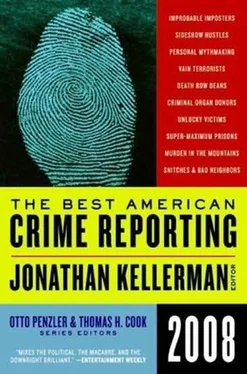When the phone rang, I knew I’d lost him. And sure enough, when I checked the message, this is what it said: “Hi, Tom, this is Zeke. Hey man, I couldn’t sleep at all last night, thinking about this story and stuff. And I gotta tell you, man, I have nothing to do with Iraq or Afghanistan, I have no operational knowledge of Iraq and Afghanistan, I have no knowledge of any operational plans that have taken place in Iraq or Afghanistan, there’s no record of me ever being in Afghanistan or Iraq, I’m a nonentity, I just don’t exist in any of that kind of thing, I have nothing to do with Iraq or Afghanistan. Anything else is fine, but I have no knowledge of, there’s no witnesses, there’s nothing that ties me to Iraq or Afghanistan, never been to Iraq or Afghanistan, I just don’t have anything to do with that, I can’t have anything to do with that, and I’m sorry, I don’t want to have anything to do with my name at all with Iraq or Afghanistan, I don’t exist in that arena, never have, never will, and I just had a sleepless night last night, so I wanted to call and tell you that I don’t know anything about Iraq or Afghanistan and never have been and never will. I hope you’re okay, your family’s okay. I just had to tell you that. So. Thanks, Tom. Bye-bye.”
WAS IT A DENIAL or a confirmation? Was it the lie that told the truth or the truth that told the lie? I called Blackwater, and it was exactly as Zeke had foretold: A spokeswoman said there was no such thing as a “designated marksman” for Blackwater: “It’s not a term we would use, because all our missions are defensive.” She confirmed that a William E. Clark had worked for Blackwater in Louisiana in the wake of Katrina, but that he was “never, ever, ever in Iraq or Afghanistan for us. He was never there on a Blackwater contract.” And then she said, “My understanding is also that he is prone to give false information and is not to be considered a trustworthy source.”
BLACKWATER, OF COURSE, had an interest in proving him a liar, since he’d come home from Louisiana and told his wife and son that he’d killed someone there. Zeke was still married to Linda then. He was still talking to Rick. He pulled both of them aside and told them that some dope addict made a play for the narcotics in storage, and he’d shot him. It wasn’t something he was proud of, because it wasn’t clean. It wasn’t precise. He’d shot him in the dark, and he’d hit him without killing him. The addict died eventually, but still. He was pretty shaken up about it, Rick said-and that’s what gave the story its legitimacy. Rick had grown up with his father’s stories. He’d come to doubt a lot of them, but there were certain ones he believed, because his father wasn’t playing the hero. Ever since Rick was a little boy, his father had told him stories about Vietnam-but the story he believed was the one where the Vietnamese captured and broke him. Why, Rick thought, would someone tell a story like that if it wasn’t true? What kind of man would try to make you believe what he was ashamed of?
DENNIS COLLINS MET William Clark in El Salvador in the mid-nineties. He will not say what he was doing there; he is, he says, prohibited from saying what he was doing there. All he will say is that he was there, and that when he was there, he met William Clark, who called himself Zeke. They were in El Salvador for different reasons, he says, but they became friends, and when they came home, Collins started getting Zeke work. Collins was associated with Nuclear Security Services Corporation, or NSSC. It provided security training for nuclear facilities, and it employed a lot of former operators. Zeke was a perfect fit, because he was so enthusiastic, such a great motivator and storyteller-when clients gave their evaluations, “the number-one guy they talk about is Zeke,” Collins said. Zeke’s success with NSSC led him to find work with DynCorp, the security company that provided manpower for the Kosovo Diplomatic Observer Mission in 1998. And his success with DynCorp led him to find work with a company that contracted with the Department of Energy to provide assault teams-adversary teams, as they’re known-that would stage mock attacks on nuclear facilities for the purpose of exposing their vulnerabilities. Zeke never would have gotten any of these jobs without Dennis Collins-Collins was a critical reference-nor would he have gotten the security-manager job at Palisades, for it was one of Collins’s associates who recommended Zeke for the position.
Zeke called Collins “my best friend in the business,” and Collins knew that Zeke was struggling at Palisades. Zeke was a “shooter and operator,” he said, and like a lot of shooters and operators, he was having trouble accepting that he had become “a desk jockey.” That was why Zeke was so desperate to get to Iraq. He and Collins had gone to Camp Pendleton, California, for counterterrorism training about five or six years ago, and Collins had seen how some of the young marines had responded to Zeke’s stories-they were enthralled. A few years later, when they went back, everything had changed. There was a war on. Now there were young marines who had been to Fallujah, and when Zeke told his stories, they were like, You don’t know what you’re talking about, old man. Zeke couldn’t take it. He became obsessed with getting to Iraq, but then, during one of the training exercises, he hit his head against a wall and passed out. People thought he was playing around, but he wasn’t. He had a neck injury that occasionally cut the flow of blood to his brain. And so he washed out. Nobody’s going to hire a guy with an injury like that. “Believe me, he’s not going to Iraq,” Collins said. “Because if he does go, he’s either going to get killed or get somebody else killed. But it’s tough, because he’s having a real hard time. If you ask me, what happened at Camp Pendleton cracked him.”
LAST OCTOBER. Zeke flew to Washington, D.C., and gave a presentation to the Department of Homeland Security. He went with one of his superiors from Palisades, and with Al DiBrito and Mike Moll, the agents from the FBI and the DHS who had become part of Zeke’s Viper team. That’s what the presentation was about: Viper. It was Zeke’s brainchild, and now he was proposing to create Viper teams at every nuclear power plant in the United States. The presentation was attended by Craig Conklin, the head of the DHS’s nuclear-hazards branch, as well as by other representatives from the FBI and the Nuclear Regulatory Commission-“about ten people in all,” Conklin says. Zeke did most of the talking and was impressive enough for some of the participants to consider Viper training as a “best practice,” in which case Zeke would be able to take his program nationwide.
ZEKE GOT SHOT IN KOSOVO. Everybody knew about it: He told some of the shooters and operators he’d met when he was staging the mock assaults on nuclear plants. It was part of Zeke’s legend. He’d gone to Kosovo for DynCorp, which had contracted to provide personnel for the State Department’s Diplomatic Observer Mission. He had a diplomatic passport. But he says he was also there as a cover. He was an operative whose mission was to determine the war-fighting capacity of the Kosovo Liberation Army. He would hike into KLA camps with not much more than a box of Marlboros and a medical kit. He should have been shot, but people would line up as soon as they saw him. He would spend all day stitching wounds and get the information he needed. Then he did get shot, and the only thing that saved him was his flak jacket. When he got home, he showed Linda the sweater with the hole in it. Did she believe him? Well, she loved him, she said. And besides, she’d seen the sweater; she’d put her finger in the hole.
THAT WAS THE FIRST THING Linda Clark said to me, the first thing she wanted me to know. They were divorced, but she still loved him. She had known him for so long that being married to him “was almost like raising another child.” He used to ride motorcycles with her first husband, and when she was divorced and became a single mother, he protected her. “He always made me feel secure,” she said. They were baptized together before they were married. But around 1984, he lost his job as a policeman in Visalia, California, for having an affair with another officer’s wife, and they struggled. They struggled financially, as he wrote the six novels that never got published and wrote the stack of plays and screenplays that never got produced-well, one did, at a community theater. And he did make a movie. Did I know that he made a movie? He did, he really did, in the early nineties, with a friend’s workmen’s-compensation check. But of course it never went anywhere, and what kept Bill and Linda afloat, she said, was Bill’s job as a chimney sweep. For twelve years, from ’84 to ’96, he worked as a chimney sweep in his hometown of Tulare, down the road from Visalia. “I’ll bet Bill didn’t tell you about that, did he?”
Читать дальше












